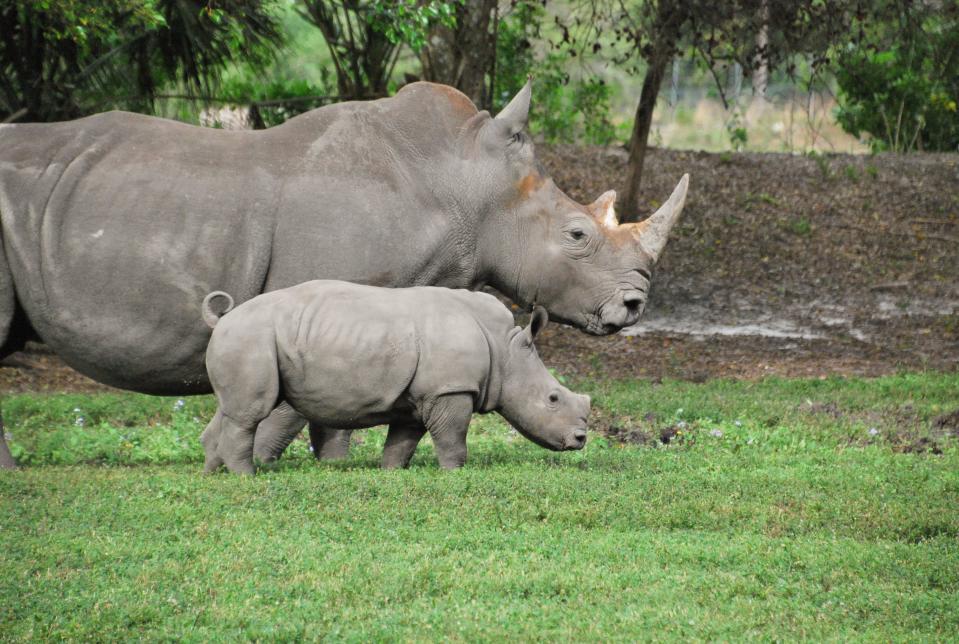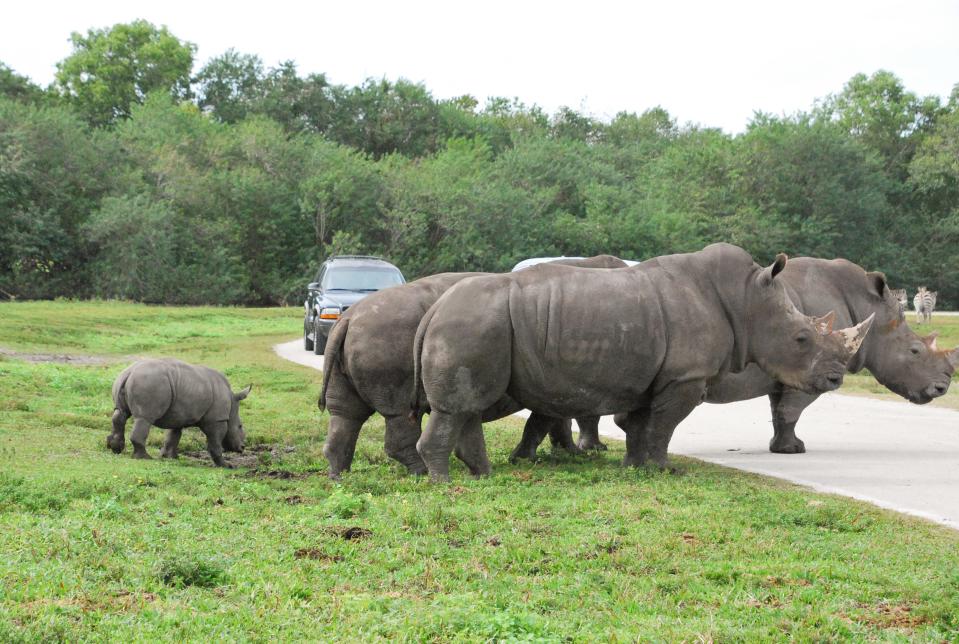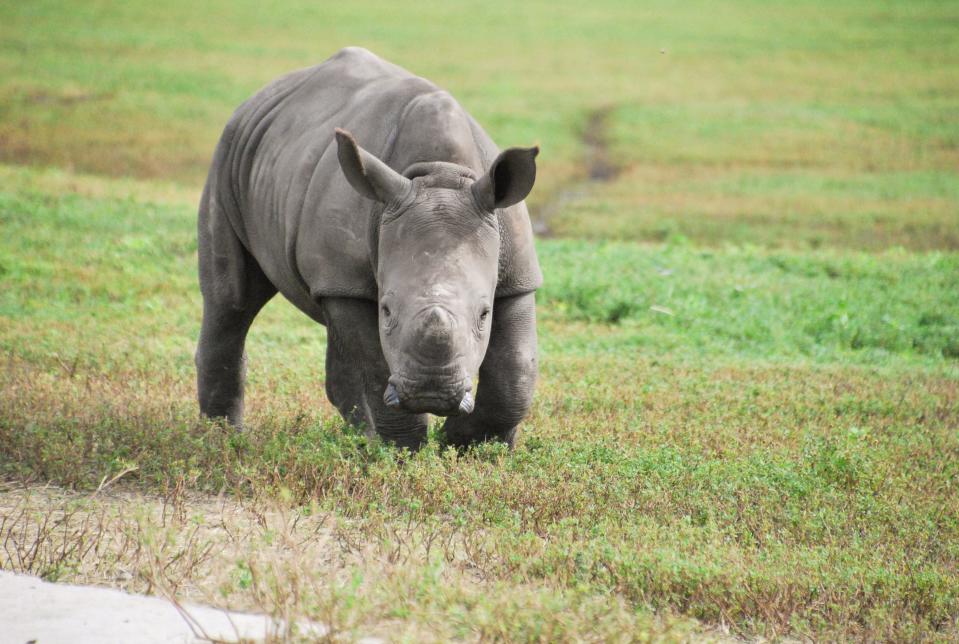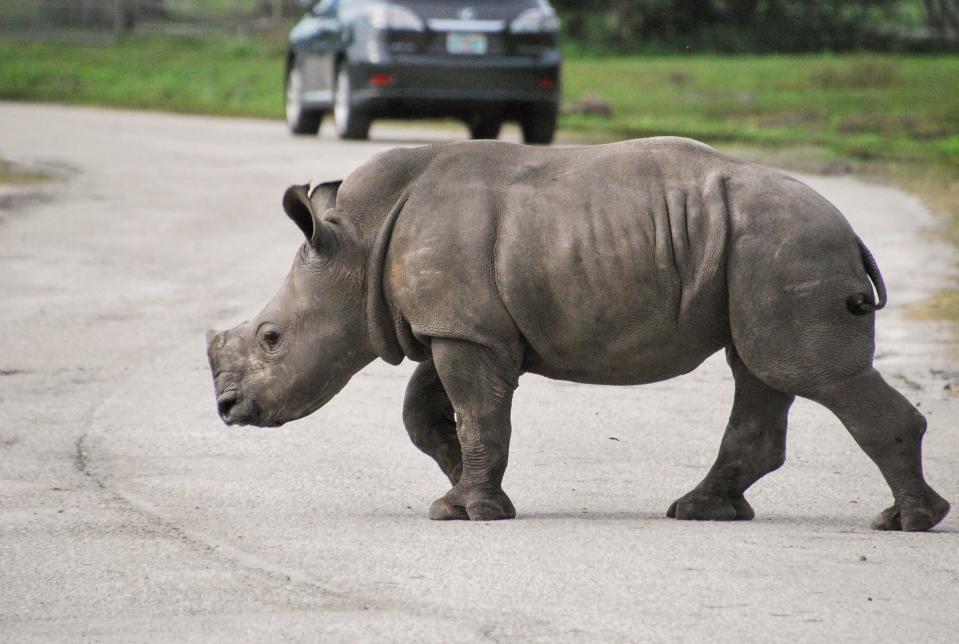Rhino herd at Lion Country Safari welcomes calves Alissa and Tabitha
LOXAHATCHEE — Guests who visit the driving trails of Lion Country Safari will now get to see two rare white rhinos calves roaming and munching on hay or enjoying a mud bath.
Alissa and Tabitha, two southern white rhinos, were born last year. They join the Loxahatchee park's 16-member white rhino herd.
"Everything is new to them," Safari spokesperson Haley McCann said. "It's all new smells and new things in the environment."
The rhino calves can be seen exploring the 30-acre Hwange National Park section of the safari where they are usually trailing behind their mothers, sunbathing on top of rocks or taking a swim in the lake, McCann said.
From Lissa to Alissa: Lion Country Safari's 40th rhino calf honors one the park mourns
Staff celebrates third generation of rhinos born at Lion Country Safari

Lion Country Safari opened in 1967 and saw its first southern white rhino birth in 1979. It is now home to 15 white rhinos; 13 females and two males.
Alissa and Tabitha were the 40th and 41st rhinos born, marking a milestone for the park, which aims to protect the critically endangered species.
Anna, a 10-year-old rhino, gave birth to her third calf, Alissa, on Aug. 19, 2023. The staff named her after Lissa, a rhino who beat a rare horn cancer and garnered the affection of animal lovers around the country before dying last year at the age of 43.
Laini, 12, gave birth to her first baby Tabitha a month later, on Sept. 26, 2023.
McCann said the births were particularly special because they marked the third generation of the species born at the park. She added Anna and Laini are sisters and their mother Bloom, who is 24 years old, is still part of the herd.
"I remember when Anna was just a tiny, little thing," McCann said. "Watching her grow up and then have kids of her own is really, really rewarding."
A banner year for wild-animal babies: Lion Country Safari says 31 births show its formula is working
Rhinos Alissa and Tabitha join herd at Lion Country Safari

McCann said Anna and Laini spent months in the safari's maternity area with their calves before they were reintroduced to the herd. As newborns, Alissa and Tabitha weighed 100 pounds and had a stub over their nose. At six months, they weigh almost 500 pounds and the tips of their horns are starting to show.
"Developing that strong bond between mom and baby is one of the most important things from the get-go," McCann said.

On their first day at the Hwange National Park, Alissa and Tabitha remained close to their moms, tailing and hiding behind their legs. Other rhinos approached the calves to sniff them.
Now, Alissa and Tabitha are running around the 30-acre habitat that features rocks, grass and a lake where they enjoyed their first mud bath.
"There's a lot of opportunities for just natural interaction with their environment," McCann said. "And also natural, social interactions with the herd."
Rhino calves lifeboat for endangered rhino species

Southern white rhinos, a species native to Africa, have two horns and are considered at risk after conservationists thought they had gone extinct in the late 1990s because of poaching.
Lion Country Safari is part of the White Rhinoceros Species Survival Plan, a national breeding program that aims to ensure there are healthy, genetically viable populations of the species under human care for at least 100 years.
"It essentially acts as a lifeboat for the species," McCann said. "Every birth really is another opportunity to secure the future for southern white rhinos."
McCann said seeing the newborns helps guests understand the value of preserving the species.
"They really strike a chord with people," McCann said. "They've really helped to solidify that connection between people and animals to get that investment as far as caring about them and their future."
Valentina Palm covers Royal Palm Beach, Wellington, Greenacres, Palm Springs and other western communities in Palm Beach County for The Palm Beach Post. Email her atvpalm@pbpost.com and follow her on X, the platform formerly known as Twitter, at @ValenPalmB. Support local journalism: Subscribe today.
This article originally appeared on Palm Beach Post: White rhino calves Alissa and Tabitha join herd at Lion Country Safari

